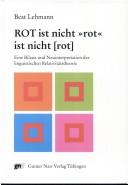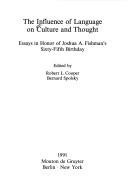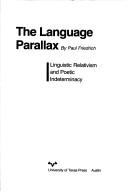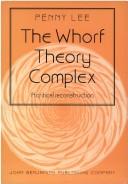| Listing 1 - 10 of 19 | << page >> |
Sort by
|

ISBN: 382335096X 9783823350965 Year: 1998 Volume: 431 Publisher: Tübingen Gunter Narr Verlag
Abstract | Keywords | Export | Availability | Bookmark
 Loading...
Loading...Choose an application
- Reference Manager
- EndNote
- RefWorks (Direct export to RefWorks)
Lexicology. Semantics --- Psycholinguistics --- Sapir-Whorf hypothesis --- Colors, Words for --- Relativity (Linguistics) --- Whorf-Sapir hypothesis --- Anthropological linguistics --- Sociolinguistics --- Words for colors --- Color --- Colors, Words for. --- Sapir-Whorf hypothesis.

ISBN: 0899258026 3110128063 9780899258027 9783110128062 Year: 1991 Publisher: Berlin de Gruyter
Abstract | Keywords | Export | Availability | Bookmark
 Loading...
Loading...Choose an application
- Reference Manager
- EndNote
- RefWorks (Direct export to RefWorks)
Language and culture --- Sapir-Whorf hypothesis --- Relativity (Linguistics) --- Whorf-Sapir hypothesis --- Anthropological linguistics --- Psycholinguistics --- Sociolinguistics --- Culture and language --- Culture --- Language and culture. --- Sapir-Whorf hypothesis.


ISBN: 3110805820 9783110805826 9027977917 9789027977915 Year: 2011 Volume: 11 Publisher: Berlin Boston
Abstract | Keywords | Export | Availability | Bookmark
 Loading...
Loading...Choose an application
- Reference Manager
- EndNote
- RefWorks (Direct export to RefWorks)
Sapir-Whorf hypothesis --- Grammar, Comparative and general --- Psycholinguistics --- Relativity (Linguistics) --- Whorf-Sapir hypothesis --- Anthropological linguistics --- Sociolinguistics --- Sapir-Whorf hypothesis - Congresses --- Grammar, Comparative and general - Congresses --- Psycholinguistics - Congresses
Book
ISBN: 9780262517751 0262517752 9780262305846 0262305844 0262517752 1282133829 9781282133822 9786613806406 6613806404 0262304929 9780262304924 Year: 2012 Publisher: Cambridge, Mass. MIT Press
Abstract | Keywords | Export | Availability | Bookmark
 Loading...
Loading...Choose an application
- Reference Manager
- EndNote
- RefWorks (Direct export to RefWorks)
Psycholinguistics --- Philosophy of language --- Language and languages. --- Sapir-Whorf hypothesis. --- Relativity (Linguistics) --- Whorf-Sapir hypothesis --- Anthropological linguistics --- Sociolinguistics --- Foreign languages --- Languages --- Anthropology --- Communication --- Ethnology --- Information theory --- Meaning (Psychology) --- Philology --- Linguistics
Book
ISBN: 9780199361588 0199361584 0190468890 0199361606 0199361592 9780199361595 Year: 2014 Publisher: Oxford Oxford University Press
Abstract | Keywords | Export | Availability | Bookmark
 Loading...
Loading...Choose an application
- Reference Manager
- EndNote
- RefWorks (Direct export to RefWorks)
Japanese has a term that covers both green and blue. Russian has separate terms for dark and light blue. Does this mean that Russians perceive these colors differently from Japanese people? Does language control and limit the way we think, such that each language gives its speakers a different 'worldview?' This opinionated book addresses the Sapir-Whorf hypothesis, which argues that the language we speak shapes the way we perceive the world. Linguist John McWhorter argues that while this idea is mesmerizing, it is plainly wrong... McWhorter shows not only how the idea of language as a lens fails but also why we want so badly to believe it: we're eager to celebrate diversity by acknowledging the intelligence of peoples who may not think like we do. Though well-intentioned, our belief in this idea poses an obstacle to a better understanding of human nature and even trivializes the people we seek to celebrate. The reality--that all humans think alike--provides another, better way for us to acknowledge the intelligence of all peoples.
Psycholinguistics --- Sociolinguistics --- Language and culture. --- Sapir-Whorf hypothesis. --- Relativity (Linguistics) --- Whorf-Sapir hypothesis --- Anthropological linguistics --- Culture and language --- Culture --- Language and culture --- Sapir-Whorf hypothesis --- Langage et culture. --- Hypothèse de Sapir-Whorf.

ISBN: 0292746504 Year: 1986 Publisher: Austin University of Texas press
Abstract | Keywords | Export | Availability | Bookmark
 Loading...
Loading...Choose an application
- Reference Manager
- EndNote
- RefWorks (Direct export to RefWorks)
Language and languages --- -Poetry --- Sapir-Whorf hypothesis --- Relativity (Linguistics) --- Whorf-Sapir hypothesis --- Anthropological linguistics --- Psycholinguistics --- Sociolinguistics --- Poems --- Poetry --- Verses (Poetry) --- Literature --- Foreign languages --- Languages --- Anthropology --- Communication --- Ethnology --- Information theory --- Meaning (Psychology) --- Philology --- Linguistics --- Philosophy --- Poetry. --- Sapir-Whorf hypothesis. --- Philosophy.
Book
ISBN: 389323232X 9783893232321 Year: 1992 Publisher: Münster Nodus-Publ.
Abstract | Keywords | Export | Availability | Bookmark
 Loading...
Loading...Choose an application
- Reference Manager
- EndNote
- RefWorks (Direct export to RefWorks)
Thought and thinking --- Sapir-Whorf hypothesis --- Language and languages --- Linguistics --- Philosophy --- Mind --- Thinking --- Thoughts --- Educational psychology --- Psychology --- Intellect --- Logic --- Perception --- Psycholinguistics --- Self --- Relativity (Linguistics) --- Whorf-Sapir hypothesis --- Anthropological linguistics --- Sociolinguistics --- Linguistic science --- Science of language --- Language and languages - Philosophy
Book
ISBN: 8840010092 9788840010090 Year: 2005 Publisher: Milano Unicopli
Abstract | Keywords | Export | Availability | Bookmark
 Loading...
Loading...Choose an application
- Reference Manager
- EndNote
- RefWorks (Direct export to RefWorks)
Anthropological linguistics --- Language and culture --- Sapir-Whorf hypothesis --- Relativity (Linguistics) --- Whorf-Sapir hypothesis --- Psycholinguistics --- Sociolinguistics --- Culture and language --- Culture --- Anthropo-linguistics --- Ethnolinguistics --- Language and ethnicity --- Linguistic anthropology --- Linguistics and anthropology --- Anthropology --- Linguistics --- Ethnology. Cultural anthropology
Book
ISBN: 9789027264008 9789027200785 9027264007 9027200785 Year: 2018 Publisher: Amsterdam Philadelphia
Abstract | Keywords | Export | Availability | Bookmark
 Loading...
Loading...Choose an application
- Reference Manager
- EndNote
- RefWorks (Direct export to RefWorks)
The relationship between landscape and culture seen through language is an exciting and increasingly explored area. This ground-breaking book contributes to the linguistic examination of both cross-cultural variation and unifying elements in geographical categorization. The study focuses on the contrastive lexical semantics of certain landscape words in a number of languages. The aim is to show how geographical vocabulary sheds light on the culturally and historically shaped ways people see and think about the land around them.Notably, the study presents landscape concepts as anchored in a human-centred perspective, based on our cognition, vision, and experience in places. The Natural Semantic Metalanguage (NSM) approach allows an analysis of meaning which is both fine-grained and transparent. The book is aimed, first of all, at scholars and students of linguistics. Yet it will also be of interest to researchers in geography, environmental studies, anthropology, cultural studies, Australian Studies, and Australian Aboriginal Studies because of the book’s cultural take.
Sapir-Whorf hypothesis --- Language and culture --- Geographical perception --- Environmental perception --- Maps, Mental --- Mental maps --- Perceptual cartography --- Perceptual maps --- Perception --- Orientation (Psychology) --- Space perception --- Culture and language --- Culture --- Relativity (Linguistics) --- Whorf-Sapir hypothesis --- Anthropological linguistics --- Psycholinguistics --- Sociolinguistics --- E-books

ISBN: 902724569X 1556196180 9786613174772 1283174774 9027283907 1556196199 9789027283900 9781556196188 9781556196195 9789027245694 9027245703 9789027245700 Year: 1996 Volume: 81 Publisher: Amsterdam Benjamins
Abstract | Keywords | Export | Availability | Bookmark
 Loading...
Loading...Choose an application
- Reference Manager
- EndNote
- RefWorks (Direct export to RefWorks)
At last - a comprehensive account of the ideas of Benjamin Lee Whorf which not only explains the nature and logic of the linguistic relativity principle but also situates it within a larger 'theory complex' delineated in fascinating detail. Whorf's almost unknown unpublished writings (as well as his published papers) are drawn on to show how twelve elements of theory interweave in a sophisticated account of relations between language, mind, and experience. The role of language in cognition is revealed as a central concern, some of his insights having interesting affinity with modern connection
Psycholinguistics --- Philosophy of language --- Sociolinguistics --- Whorf, B. --- Whorf, Benjamin Lee --- Sapir-Whorf hypothesis. --- Linguistic analysis (Linguistics) --- Analysis, Linguistic (Linguistics) --- Analysis (Philosophy) --- Grammar, Comparative and general --- Relativity (Linguistics) --- Whorf-Sapir hypothesis --- Anthropological linguistics --- Whorf, Benjamin Lee, --- Whorf, B. L. --- וורף, בנג׳מין לי, --- Sapir-Whorf hypothesis --- Analyse linguistique (Linguistique) --- Sapir-Whorf, Hypothèse de
| Listing 1 - 10 of 19 | << page >> |
Sort by
|

 Search
Search Feedback
Feedback About UniCat
About UniCat  Help
Help News
News